- Home
- Amy Harmon
What the Wind Knows Page 9
What the Wind Knows Read online
Page 9
“What can we do?”
“You can’t do anything,” he said, and smiled feebly to soften his rejection. “I’ll make sure Mary’s hands heal. The family will move in with Patrick’s kin until the roof is repaired. Then they’ll carry on.”
“Were there weapons?” I asked.
“They didn’t find any,” he answered, his eyes holding mine for a moment, considering, before he looked away. “But Martin has—had—a reputation for gun running.”
“What are the guns for?”
“What the guns are always for, Anne. We fight the British with flaming balls of shit and homemade grenades. And when we’re lucky, we fight them with Mausers too.” His voice had grown edgy, and his jaw was tight.
“We?” I ventured.
“We. Once upon a time we included you. Does it still?”
I searched his eyes, uncertain and unsettled, and remained silent. I could not answer a question I didn’t understand.
When he closed the door, he left a dark handprint behind.
Sometime long after the tall clock in the broad foyer struck one, I came awake to little hands on my cheeks and a small nose pressed to mine.
“Are you sleeping?” Eoin whispered.
I touched his face, overjoyed to see him. “I must be.”
“Can I sleep with you?” he asked.
“Does your grandmother know you’re here?” I murmured, moving my hand to the soft pelt of crimson hair curling over his brow.
“No. She’s asleep. But I’m afraid.”
“What are you afraid of?”
“The wind is very loud. What if we don’t hear the Tans? What if the house is on fire, and we are all asleep?”
“What are you talking about?” I soothed, stroking his hair.
“They burned down Conor’s house. I heard Doc talking to Nana,” he explained, his eyes wide, his tone plaintive.
“Eoin?” Thomas stood at the door, washed and changed but not for bed. From the looks of it, he hadn’t been sleeping. He wore trousers, a white button-down shirt, and his boots. He clutched a rifle in his right hand.
“Are you watching for the Tans, Doc?” Eoin gasped.
Thomas didn’t deny it but propped the gun against the wall and entered the room. He closed the distance to my bed and stretched out his hand to Eoin. “It’s the middle of the night, lad. Come.”
“My mother is going to tell me a story,” Eoin fibbed stubbornly, and my heart groaned in tender protest. “What if you watch from that window and listen with me, Doc?” Eoin pointed, impudent, at the view of the long lane stretching into darkness.
“Anne?” Thomas sighed, clearly seeking reinforcement.
“Please let him stay,” I urged. “He’s frightened. He can sleep here.”
“I can sleep here, Doc!” Eoin warmed to the idea like it was his own, which, after all, it was.
“Careful, Eoin,” Thomas warned. “Don’t climb over your mother. Go around.”
Eoin immediately scurried to the other side of the bed and scrambled up, squirming down in the covers beside me, his body so close to mine, there was room for Thomas to join us. He didn’t.
Instead, he moved the chair beside my bed to the window overlooking the lane and sat, eyes trained on the shadows. Eoin had not been wrong; he was keeping watch.
I told Eoin the Irish legend of Fionn and the Salmon of Knowledge and how Fionn came to have a magic thumb. “When Fionn needed to know something, he simply stuck his thumb in his mouth, and the answer would come to him,” I said, coming to the end of the tale.
“More, please,” Eoin whispered, clearly hoping Thomas wouldn’t hear. Thomas sighed but didn’t protest.
“Do you know the story of Setanta?” I asked.
“Do I know the story of Setanta, Doc?” Eoin forgot he was being sneaky.
“Yes, Eoin,” Thomas answered.
“I can’t remember it very well, though. I think I need to hear it again,” Eoin implored.
“All right,” I agreed. “Setanta was the son of Dechtire, who was sister to Conchobar mac Nessa, the king of Ulster. Setanta was just a young boy, but he wanted very badly to be a warrior like the knights who fought for his uncle. One day, when his mother wasn’t looking, Setanta sneaked away and began the long journey to Ulster, determined to join the Knights of the Red Branch. It was a grueling journey, but Setanta did not turn back to the safety of his mother’s arms.”
“Grueling?” Eoin interrupted, puzzled.
“Very difficult,” I supplied.
“Didn’t he love his mother?” he asked.
“Yes. But he wanted to be a warrior.”
“Oh.” Eoin sounded doubtful, as though he didn’t really understand. He twined one arm around my neck and laid his head on my chest. “He could have waited,” he murmured.
“Yes,” I whispered, and closed my eyes against a sudden rise of tears. “But Setanta was ready. When he reached his uncle’s court, he did everything he could to impress the king. And even though he was small, he was very fierce and very courageous, and the king said he could train to be a knight. Setanta learned many things. He learned to stay silent when it was wise to be silent. He learned to fight when he must. He learned to listen to the wind and to the earth and to the water so that his enemies would never take him by surprise.”
“Did he see his mother again?” Eoin asked, still caught on that one detail.
“Yes. And she was very proud,” I whispered.
“Tell me the part about the hound,” he demanded.
“You do remember this story,” I murmured.
Eoin was silent, realizing he’d been caught in a lie. I finished, regaling him with the story of King Conor dining at the house of his smith, Culann, and Setanta killing Culann’s savage hound. Setanta had pledged from that day forward to guard the king as the hound had done, forever more being called Cú Chulainn, the hound of Culann.
“You are a very good storyteller,” Eoin murmured sweetly, tightening his small arms around me, and the lump in my throat grew so big, it overflowed and spilled down my cheeks.
“Why are you crying? Are you sad Setanta killed the hound?” Eoin asked.
“No,” I answered, turning my face into his hair.
“You don’t like dogs?” Eoin was shocked, and his voice rose.
“Shh, Eoin. Of course, I do.” His dismay made me giggle despite the emotion that clogged my throat.
“Setanta had to kill the hound,” Eoin reassured me, still convinced the story had made me weep. “Or the hound would have killed him. Doc says killing is wrong, but sometimes it has to be done.”
Thomas turned from the window, a flicker of lightning illuminating the angles of his face only to retreat and leave him in darkness again.
“Eoin,” he rebuked softly.
“You’re just like the hound, Doc. You protect the house.” Eoin was undeterred.
“And you are like Fionn. You ask too many questions,” Thomas retorted mildly.
“I need a magic thumb like Fionn.” Eoin held his hands in the air, curling his fingers and sticking out his thumbs, examining them.
“You will have magic fingers instead. Just like Doc. You will make people well with your steady hands,” I said, keeping my voice low. It had to be close to three o’clock in the morning, and Eoin showed no signs of drowsiness. The little boy almost vibrated with energy.
I reached up and wrapped my hands around his, pulling them down to his sides and repositioning the pillow beneath his head.
“It’s time to sleep now, Eoin,” Thomas said.
“Will you sing to me?” Eoin asked, raising imploring eyes to mine.
“No. But I will tell you a poem. Poems can be like a song. But you need to close your eyes. It is a very, very long poem. More like a story.”
“Good,” Eoin said, clapping.
“No clapping. No talking. Eyes closed,” I said.
Eoin obeyed.
“Are you comfortable?” I whispered.
“Yes,” he whispered back, keeping his eyes shut.
I pitched my voice soft and low and began, “I hardly hear the curlew cry, nor the grey rush when the wind is high.” I narrated slowly, letting the rhythm and the words lull the boy into slumber. “Baile and Aillinn” had always put Eoin to sleep. He was snoring softly before I reached the end, and I stopped, allowing the story to fade without being finished.
Thomas turned from the window. “That isn’t the end.”
“No. Eoin’s asleep,” I murmured.
“But I’d like to hear it,” he said quietly.
“Where did I leave off?”
“They come where some huge watcher is, and tremble with their love and kiss,” he said, quoting the line perfectly. The words from his mouth sounded erotic and warm, and I picked up the thread eagerly, wanting to please him.
“They know undying things, for they wander where earth withers away,” I recited, and I continued softly through the final stanzas, finishing with the words I loved the most. “For never yet has lover lived, but longed to wive, like them that are no more alive.”
“For them that are no more alive,” he whispered. The room was hushed with the afterglow that a good story always leaves behind, and I closed my eyes and listened to little Eoin breathe, hardly daring to breathe myself, not wanting the moment to pass too soon.
“Why were you crying? You didn’t answer him.”
I examined my answer briefly, unsure of what to reveal, before settling on the simplest version of my complicated emotions. “My grandfather told me those stories. He told me about the hound of Culann. Now I’m telling Eoin. Someday, he will tell his granddaughter the stories I told him.”
I told you. You told me. Only the wind knows which truly comes first.
Thomas turned from the window, framed in the weak light, waiting for me to continue, and I tried to explain the glorious tumult in my chest.
“Lying here next to him. His sweetness. His arms around my neck. I realized how . . . happy . . . I am.” The truth was odd, making it seem false. I missed my grandfather. I missed my life. I was afraid. Terrified. Yet a part of me was overcome with gratitude for the little boy beside me and the man who stood guard at my bedroom window.
“You’re happy, so you cry?” Thomas questioned.
“I’ve cried a great deal lately. But this time, they were tears of joy.”
“There is little reason for happiness in Ireland these days.”
“Eoin is reason enough for me,” I answered, and marveled again that it was true.
Thomas was quiet for so long my eyes grew heavy, and sleep crept up on me.
“You are so different, Anne. I hardly know you,” Thomas murmured. Sleep fled, frightened off by my pounding heart and the sound of his voice. Sleep didn’t return, and Thomas didn’t leave. He kept vigil, eyes on the dark trees and the empty lane, watching for a threat that never came.
When dawn peeped through the trees, Thomas lifted the sleepy child, limp and loose, from my arms. I watched them go, Eoin’s vivid head on Thomas’s shoulder, his little arms dangling over his back.
“I’ll put him back in his bed before Brigid wakes. She need never know. Try to sleep now, Anne,” Thomas said wearily. “I think we’re safe from the Tans for the time being.”
I dreamed of pages that whirled around my head. I would capture one and hold it against my chest, only to lose it again when I tried to read it. I chased the fluttering bits of white out into the lake, knowing the water would blur the words I hadn’t read. I watched the pages come closer with the waves, taunting me for a moment with the possibility of rescue, only to sink slowly beneath the surface. It was a dream I’d had before. I’d always thought it stemmed from my need to write things down, to preserve them, to give them eternal life, if only on a page. I came awake gasping, remembering. Thomas Smith’s journal, the one that ended with a warning to his love, might very well be at the bottom of Lough Gill. It had been in my bag, the picture of Garvagh Glebe tucked between the pages. I’d forgotten about it; it had been lying there beneath the urn with Eoin’s ashes.
A wave of sorrow and regret pinned me back against the pillows. I’d been so foolish, so careless. In that book Thomas Smith had lived, and now it was gone. We were specks, bits of glass and dust. We were as numerous as the sands that lined the strand, one unrecognizable from the other. We were born; we lived; we died. And the cycle continued endlessly on. So many lives lived. And when we died, we simply vanished. A few generations would go by. And no one would know we even were. No one would remember the color of our eyes or the passion that raged inside us. Eventually, we all became stones in the grass, moss-covered monuments, and sometimes . . . not even that.
Even if I returned to the life I’d lost in the lough, the book would still be gone. Thomas Smith would be gone—the slant of his words, the turn of his phrase, his hopes and his fears. His life. Gone. And the thought was unbearable to me.
19 March 1919
The Great War is over, but Ireland’s war is just beginning. An armistice was signed on 11 November, signaling the end of the bloody conflict and the end of conscription fears. Over two hundred thousand Irish boys still fought, even without conscription, and thirty-five thousand of them died for a country that doesn’t recognize their right to self-determination.
Maybe that boiling cauldron is finally ready to overflow. In the December general elections, Sinn Féin candidates won seventy-three of the 105 Irish seats in the House of Commons of the United Kingdom. None of the seventy-three will take their seats at Westminster. In accordance with the manifesto signed by each member of Sinn Féin in 1918, Ireland will form her own government, the first Dáil Éireann.
Mick has been organizing breakouts for political prisoners, smuggling in files to cut through bars, throwing rope ladders over walls, and pretending the spoons in their coat pockets were revolvers to scare off the warders. He couldn’t stop laughing when he described the Mountjoy jail breakout and the fact that they got twenty prisoners instead of three.
“O’Reilly was waiting outside the jail with three bicycles!” he howled. “He came in here shouting that the whole jail was loose.”
Mick broke Eamon de Valera, the newly elected president of the Irish Republic, out of Lincoln Prison in February only to discover de Valera has plans to go to America to raise money and support for Irish independence. No estimates as to how long he’ll be there. I’ve never seen Mick so flabbergasted. He feels abandoned, and I can hardly blame him. The load on his shoulders is enormous. He sleeps even less than I do. He’s ready for all-out war, but de Valera says the public is not.
I’ve had very little time for collecting information. Influenza has broken out all over Europe, and my little corner of Ireland has not been spared. I hardly know what day it is most of the time, and I’ve tried to stay far away from Eoin and Brigid to protect them from the disease that must cling to my skin and clothes. When I’m able to come home at all, I remove my clothes in the barn and have bathed in the lough more times than I can count.
I’ve seen Pierce Sheehan and Martin Carrigan on the lake a time or two when I rowed across to check on the O’Briens. I know they’re bringing guns from Sligo’s docks. Where they go when they leave the lake, I don’t know. If they’ve seen me, they pretend not to; I suppose it’s safer that way, for all of us.
Peader and Polly O’Brien’s grandson, Willie, passed away from influenza last week. He wasn’t much older than Eoin. Eoin will miss the lad. They played together a few times. Peader insisted on spreading the boy’s ashes on the lake. Cremation has become preferable to stop the spread of the disease. Peader’s boat turned up on the Dromahair side of the lake day before last. Eamon Donnelly found it, but sadly, Peader wasn’t in it. He hasn’t come home, and we fear the lough has taken him. Now poor Polly is all alone. Too much sadness all around.
T. S.
8
THE MASK
I would but find what’s there to find,
Love or
deceit.
It was the mask engaged your mind,
And after set your heart to beat,
Not what’s behind.
—W. B. Yeats
I wasn’t sure if Thomas sent Brigid or if she’d taken it upon herself, but she’d stomped into my room two days later and declared it time I was up and dressed. “When you didn’t come back from Dublin, I put your things in the chest there. I kept Declan’s belongings.” Her voice caught, and she finished in a rush. “I’m sure you’ll recognize your clothes. It isn’t much. The doctor is seeing patients in Sligo today. He said he’d take you to the shops for the other things you’re in need of.”
I nodded eagerly, climbing gingerly from my bed. I was healing, but it would be a while before I could move without pain.
“You look like a gypsy with that hair,” Brigid snapped, eyeing me. “You’ll need to cut it or pin it up. People will think you’ve escaped from an asylum. But that’s what you want them to think, isn’t it? If people think you’re crazy, you won’t have to explain yourself.”
I tried to smooth my dark curls, embarrassed. I couldn’t imagine myself with the Gibson Girl updo Brigid wore. I didn’t know if it was the fashion of the day, but I wouldn’t be adhering to it. Anne’s hair had been jaw-length in one of her photos, her hair curling softly around her face. I couldn’t imagine myself in that style either. My hair was too curly. With no weight from its length to hold it down, it would be enormous. As for Brigid’s assertion of craziness, it wasn’t a terrible idea. If people thought I was deranged, they would keep their distance.
Brigid continued, muttering bitterly as though I weren’t in the room. “You turn up out of nowhere—with a gunshot wound, no less—wearing men’s clothes, and you expect us to welcome you with open arms.”
“I expected no such thing,” I answered, but she ignored me, unlocking the chest beneath the front window with a small key she withdrew from her apron pocket. She lifted the top and, satisfied that the chest contained the items she remembered, turned to leave the room.

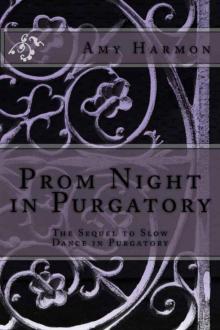 Prom Night in Purgatory
Prom Night in Purgatory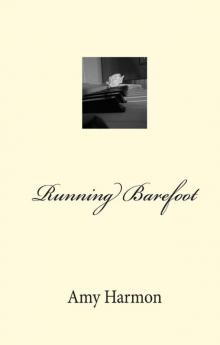 Running Barefoot
Running Barefoot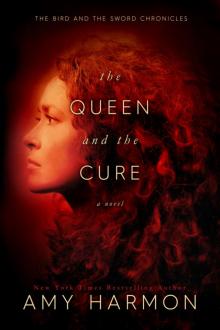 The Queen and the Cure
The Queen and the Cure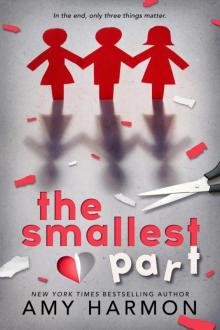 The Smallest Part
The Smallest Part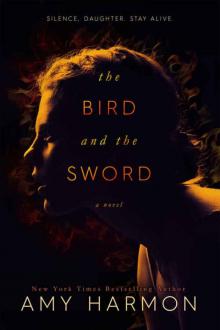 The Bird and the Sword
The Bird and the Sword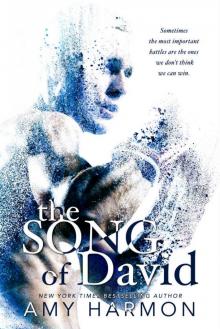 The Song of David
The Song of David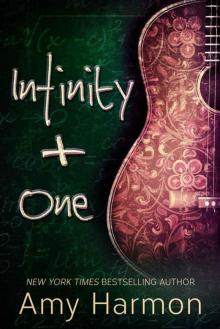 Infinity + One
Infinity + One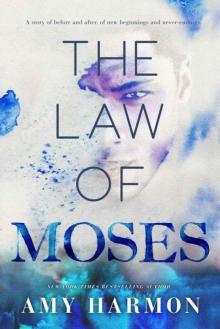 The Law of Moses
The Law of Moses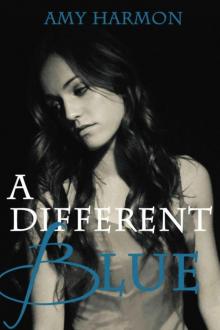 A Different Blue
A Different Blue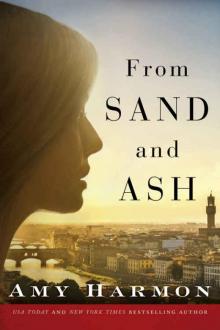 From Sand and Ash
From Sand and Ash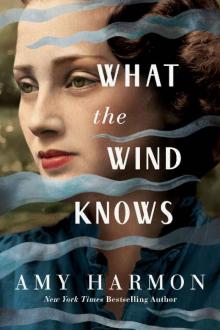 What the Wind Knows
What the Wind Knows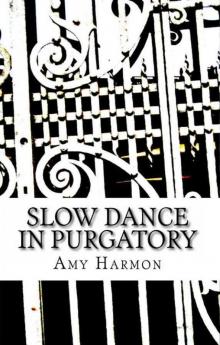 Slow Dance in Purgatory
Slow Dance in Purgatory Romance Through the Ages
Romance Through the Ages